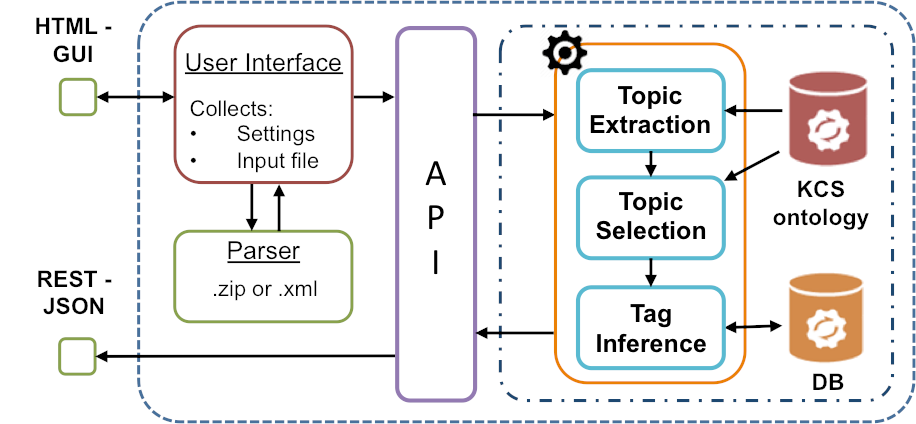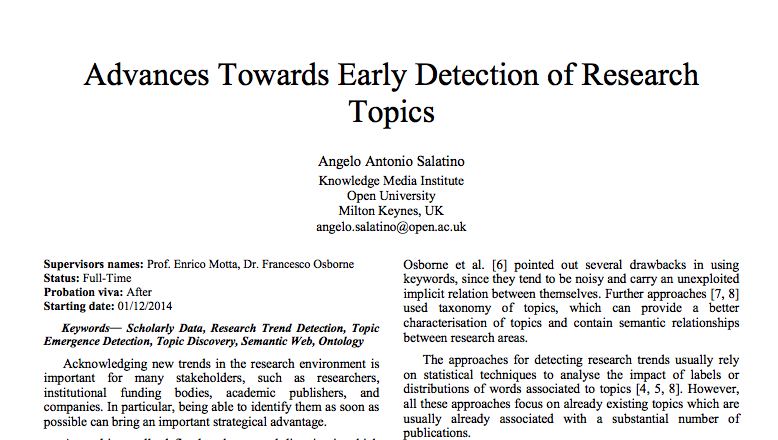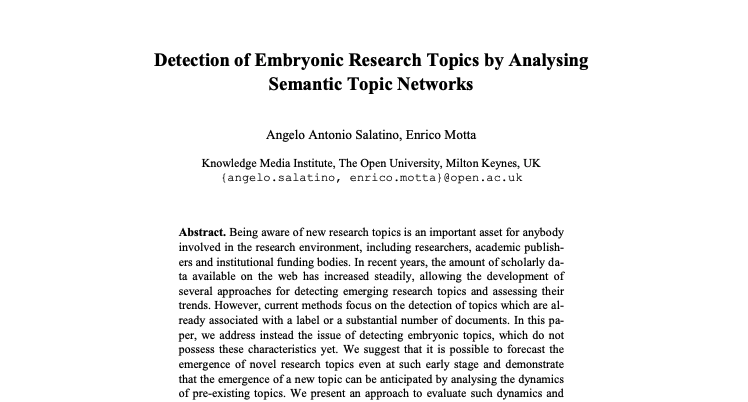On the 8th February I delivered a seminar to my department (KMi @ OU) in which I described the work I have been doing in the last two years for my postgraduate research. I started with a little bit of introduction about science. Shortly, I moved to the currently available technologies for keeping track of the […]
Tag: Scholarly Data
Ontology Forecasting in Scientific Literature: Semantic Concepts Prediction based on Innovation-Adoption Priors
“Ontology Forecasting in Scientific Literature: Semantic Concepts Prediction based on Innovation-Adoption Priors” is a peer-reviewed paper presented on Tuesday 22nd November 2016 at the “Entity detection, matching and evolution” session at the 20th International Conference on Knowledge Engineering and Knowledge Management, Bologna, Italy Authors: Amparo Elizabeth Cano-Basave, Francesco Osborne and Angelo Antonio Salatino Abstract: The […]
Smart Topic Miner: Supporting Springer Nature Editors with Semantic Web Technologies
“Smart Topic Miner: Supporting Springer Nature Editors with Semantic Web Technologies” is poster paper presented at the Poster and Demo session [D45] on Wednesday 19th October 2016 at the 15th International Semantic Web Conference in Kobe, Japan Authors: Francesco Osborne, Angelo Antonio Salatino, Aliaksandr Birukou and Enrico Motta Abstract: Academic publishers, such as Springer Nature, annotate scholarly products […]

Automatic Classification of Springer Nature Proceedings with Smart Topic Miner
“Automatic Classification of Springer Nature Proceedings with Smart Topic Miner” is conference paper presented on Friday 21st October 2016 at the 15th International Semantic Web Conference in Kobe, Japan Authors: Francesco Osborne, Angelo Antonio Salatino, Aliaksandr Birukou and Enrico Motta Abstract: The process of classifying scholarly outputs is crucial to ensure timely access to knowledge. However, this […]

Advances Towards Early Detection of Research Topics
Acknowledging new trends in the research environment is important for many stakeholders, such as researchers, institutional funding bodies, academic publishers, and companies. In particular, being able to identify them as soon as possible can bring an important strategical advantage. A trend is usually defined as the general direction in which something is evolving. It is […]

Detection of Embryonic Research Topics by Analysing Semantic Topic Networks
“Detection of Embryonic Research Topics by Analysing Semantic Topic Networks” is a workshop paper I presented at the SAVESD workshop held in conjunction with the World Wide Web Conference in 2016 in Montreal (CA). Angelo Antonio Salatino and Enrico Motta Abstract Being aware of new research topics is an important asset for anybody involved in […]

Early Detection and Forecasting of Research Trends
“Early Detection and Forecasting of Research Trends” is a paper presented at the Doctoral Consortium of the 14th International Semantic Web Conference (ISWC2015) in Bethlehem (PA, USA). Abstract Identifying and forecasting research trends is of critical importance for a variety of stakeholders, including researchers, academic publishers, institutional funding bodies, companies operating in the innovation space and others. […]



